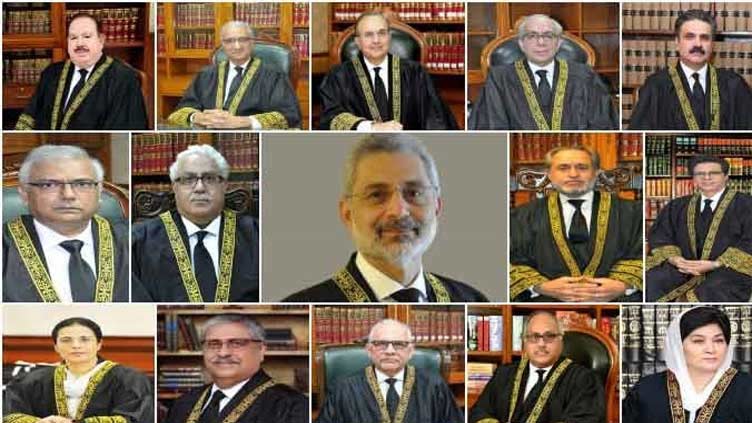ISLAMABAD (HRNW) Chief Justice of Pakistan (CJP) Qazi Faez Isa on Tuesday barred Justice Ijazul Ahsan and Justice Muneeb Akhtar from questioning lawyers during proceedings on the pleas against the Supreme Court (Practice and Procedure) Act 2023 and told them to hold their queries.
The chief justice-led full bench comprises 15 judges – Justice Sardar Tariq Masood, Justice Ijazul Ahsan, Justice Syed Mansoor Ali Shah, Justice Munib Akhtar, Justice Yahya Afridi, Justice Aminuddin Khan, Justice Sayyed Mazahar Ali Akbar Naqvi, Justice Jamal Khan Mandokhel, Justice Muhammad Ali Mazhar, Justice Ayesha A. Malik, Justice Athar Minallah, Justice Syed Hasan Azhar Rizvi, Justice Shahid Waheed and Justice Musarrat Hilali.
The petitioners sought to regulate the discretionary powers of the chief justice. The hearing is being broadcast live on state-run television.
Justice Ahsan remarked that an attempt was made to interfere in the independence of the apex court by enacting the law.
Today’s proceedings
At the outset of proceedings today, MQM counsel Faisal Siddiqui argued that the Supreme Court (Practice and Procedure) Act could be amended by simple majority. He contended that he would cite two judgements in his defence as they are relevant in this case.
Justice Aysha Malik questioned him what the word “law” means in the Article 191. Does it authorise parliament to enact law?
Advocate Siddiqui replied to Justice Malik that the Supreme Court rules define what is law. There was no ambiguity in the minds of framers of rules about the meaning of world “law”.
The counsel favoured the act and requested the court to dismiss pleas against the law on merit.
Justice Ahsan intervened and told Advocate Siddiqui that he wanted to ask a question. The CJP asked him to continue his argument and do not reply to question.
Later, the CJP stopped Justice Akhtar from asking questions. Justice Akhtar said he was a judge and it was his right to ask questions.
The CJP told Advocate Siddiqui to continue as the court was hearing the case for four days and could not conclude the proceedings.
The CJP told Justice Akhtar to let the counsel complete his arguments and ask the question later. He remarked that if one has made up his mind, he could express his judgement in the final decision.
Justice Akhtar reacted to it and said he just wanted answer to his question.
Justice Akhtar protested that he was barred from asking question. He asked the CJP to explain the word “law” in the Article 191.
CJP Isa told him that he could ask questions but first let the lawyer finish.
Justice Ahsan intervened and questioned whether the procedure act was not an interference in the working of Supreme Court? Advocate Siddiqui argued that “subject to” and “law” can be read separately.
Justice Ahsan asked another question; judiciary, executive and legislature are independent entities? Isn’t it interference in the internal working and independence of judiciary?
Advocate Siddiqui said the Act should not be considered interference in the affairs of Supreme Court. Parliament cannot legislate any law that would bar Supreme Court from making rules.
Justice Ahsan remarked that the parliament transgressed constitutional restrictions by enacting the Act.
Advocate Siddiqui submitted that he would argue how the parliament not violated constitution. Parliament has the authority to supervise the working of Supreme Court.
Justice Ahsan said does that mean parliament can control the apex court. Advocate Siddiqui replied that parliament’s authority is of supervisory nature.
Justice Akhtar asked him do “legislative entries” give parliament supervisory authority.
Justice Shah remarked that parliament has authority to legislate by reading Article 191 with legislative entry 58. What is the meaning of word “practice” in Supreme Court procedures?
